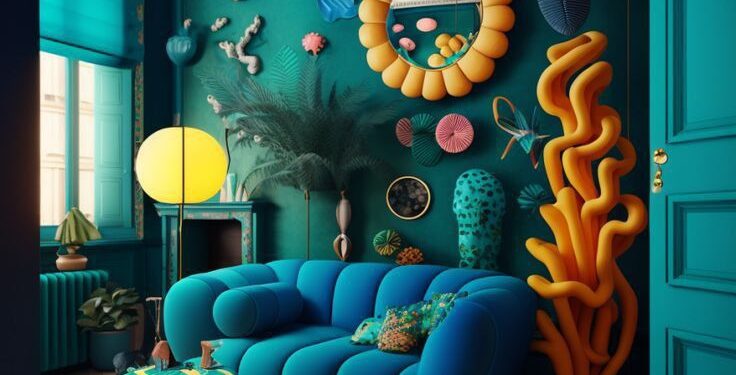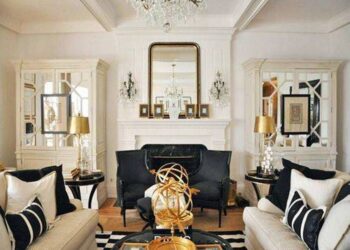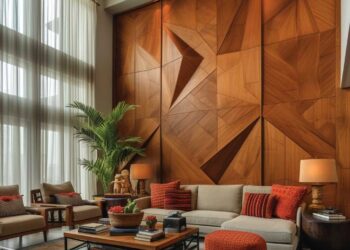The Rise of Maximalism
Once viewed as garish or cluttered, maximalism has reclaimed respect as a sophisticated style that champions individuality. Several factors have fueled its resurgence:
A. Desire for Personalization: After years of cookie‑cutter minimal spaces, people crave homes that reflect unique tastes and stories.
B. Digital Influence: Social media platforms showcase extravagant interiors, inspiring followers to experiment with bold combinations.
C. Well‑Being & Comfort: Surrounding oneself with cherished objects and rich textures fosters warmth and psychological comfort.
D. Sustainability Mindset: Curating heirlooms, art, and secondhand finds aligns with eco‑friendly practices by reducing waste.
E. Cultural Diversity: A global exchange of patterns and materials encourages eclectic layering—Moroccan rugs meet Japanese ceramics, Indian textiles complement Italian leather.
This blend of personal expression, digital inspiration, and sustainability has propelled maximalism into mainstream design.
Core Principles of Maximalist Design
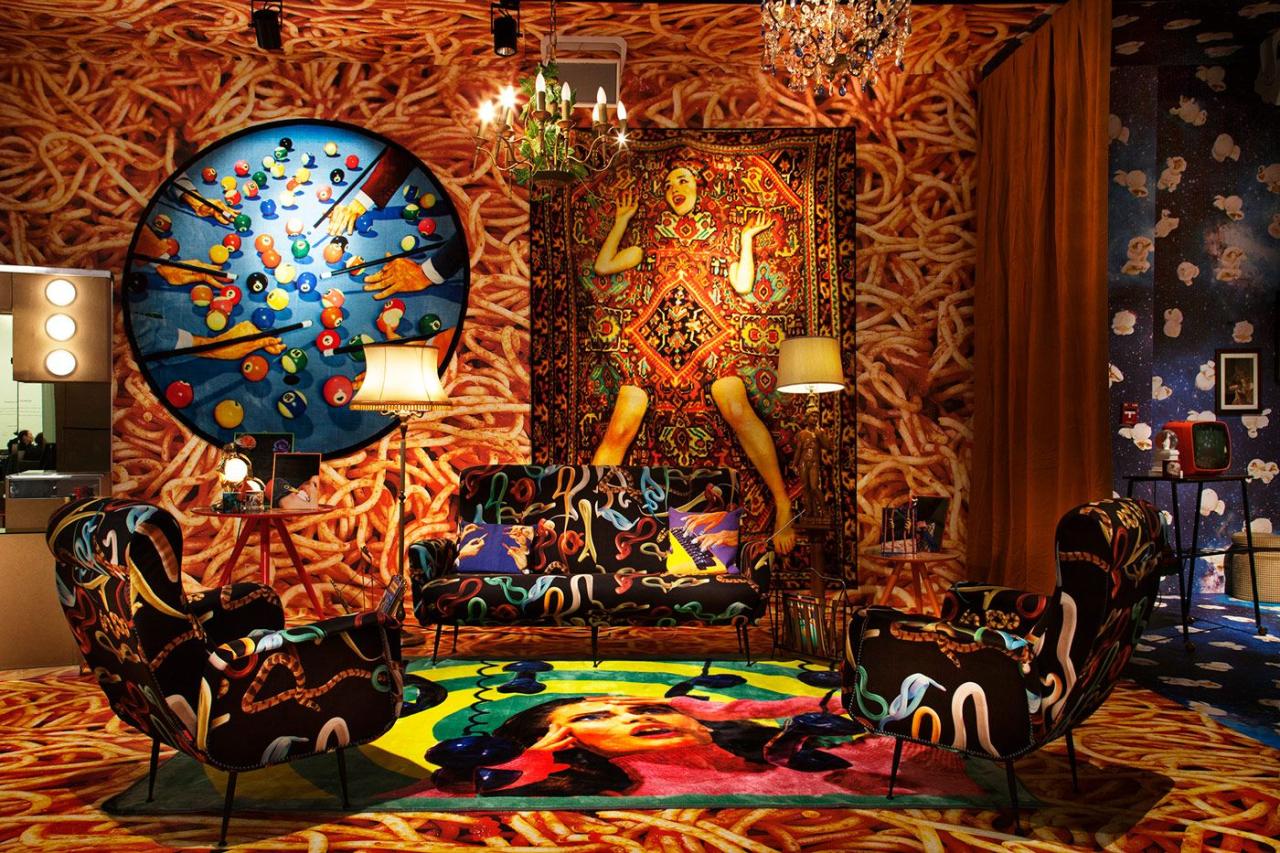
Maximalism isn’t chaos—it follows guiding tenets to create cohesive, impactful interiors. Key principles include:
A. Layered Textures and Patterns: Mix velvets, silks, woven fabrics, and leathers with florals, geometrics, animal prints, and ikat to build depth.
B. Vibrant Color Palettes: Bold jewel tones, saturated primaries, and unexpected pairings create visual drama—think emerald green with fuchsia, or cobalt with saffron.
C. Curated Collections: Display meaningful objects—books, art, travel mementos—on open shelving, walls, and tabletops to tell your story.
D. Balance Through Repetition: Repeat key colors, shapes, or motifs across elements (e.g., echo a red accent pillow in a vase or artwork) to unify the composition.
E. Grand Focal Points: Anchor rooms with statement pieces—a patterned wallpaper, a large-scale painting, or an ornate chandelier—to guide the eye and set the tone.
F. Mix of Old and New: Blend antique furniture with contemporary accents; pair modern art with vintage rugs for timeless layering.
By following these tenets, maximalism transforms potential clutter into harmonious, vibrant spaces.
Designing a Maximalist Living Room
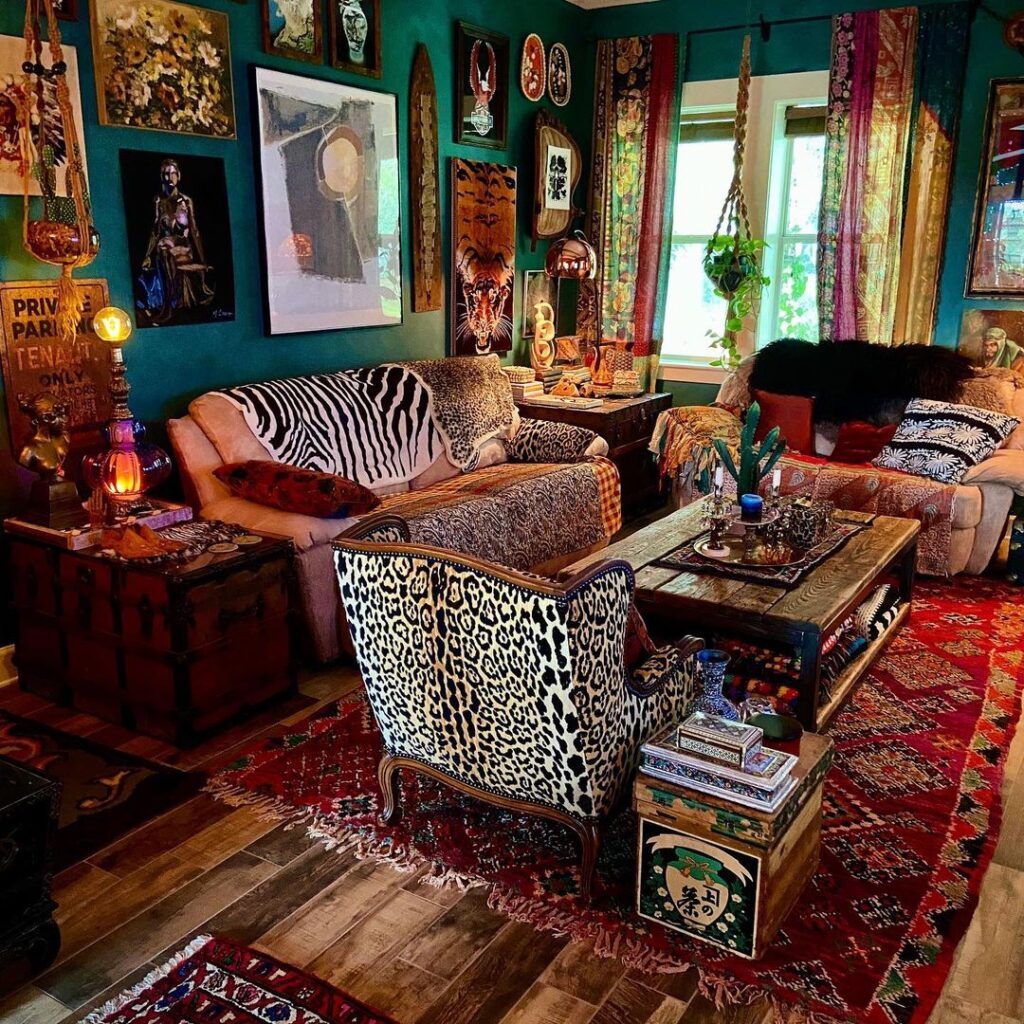
The living room is a natural entry point for maximalism. To craft an inviting, eclectic lounge:
A. Choose a Bold Backdrop: Opt for patterned wallpaper—tropical leaf prints, chinoiserie panels, or Art Deco geometrics.
B. Anchor with a Statement Sofa: Select a velvet or leather sofa in a striking hue (ruby red, sapphire blue). Accent with mismatched throw pillows in complementary patterns.
C. Layer Rugs: Place multiple rugs—oriental, kilim, flokati—over one another to add warmth and texture.
D. Curate Wall Art Gallery: Hang framed paintings, prints, and mirrors of various sizes for a dynamic focal wall.
E. Showcase Collectibles: Install open shelving or a display cabinet to feature ceramics, sculptures, and books—curated by color or theme.
F. Install Dramatic Lighting: A beaded chandelier or sculptural floor lamp adds glamour and ensures the room feels well-lit and welcoming.
This approach turns your living room into a rich tapestry of textures, colors, and stories.Maximalist Kitchen and Dining Spaces
Maximalism isn’t limited to lounging areas—kitchens and dining rooms also thrive on exuberant design:
A. Colorful Cabinetry: Paint lower and upper cabinets in two contrasting jewel tones (emerald and burgundy) or cover them with hand‑painted tiles.
B. Patterned Backsplash: Install mosaic, encaustic, or patterned subway tiles to inject graphic interest.
C. Statement Lighting: Hang oversized pendants in glass, brass, or layered beaded designs above the island or table.
D. Eclectic Dinnerware: Mix and match plates, bowls, and glassware in assorted colors and patterns for a spirited table setting.
E. Open Shelving Displays: Showcase vintage kitchenware, colorful ceramics, and cookbooks in coordinated color groupings.
F. Bold Wallpaper Accents: Apply wallpaper on an accent wall or inside glass‑front cabinets for unexpected pops.
A maximalist kitchen becomes a vivid, joyful hub where cooking and entertaining are elevated to sensory experiences.
Embracing Maximalism in the Bedroom
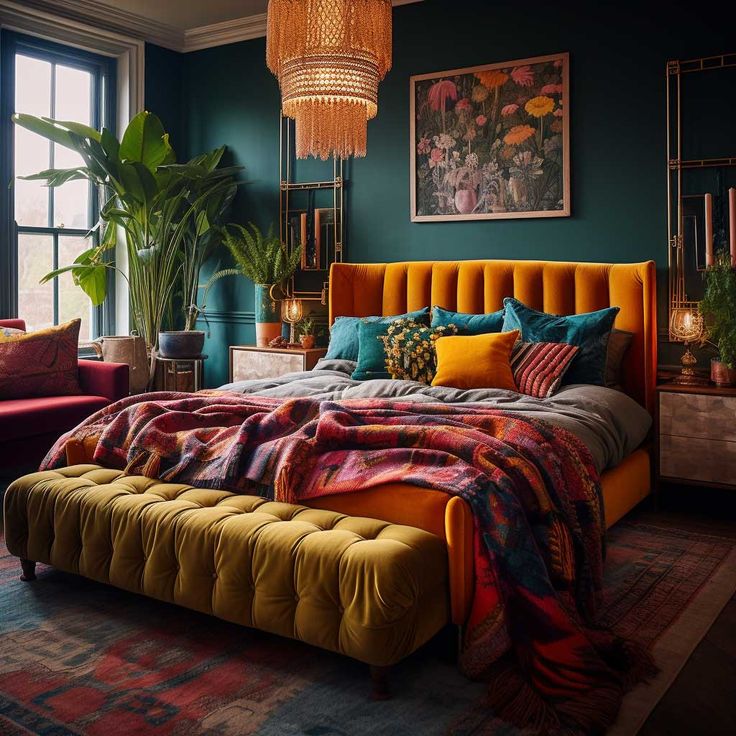
Your bedroom should be a sanctuary of self‑expression and comfort. Maximalist bedrooms achieve this through layered textiles and vibrant décor:
A. Vibrant Bedding: Choose richly patterned duvets and mix with patterned sheets, quilts, and an array of decorative pillows.
B. Statement Headboard: Upholster a tall headboard in a saturated velvet or fabric with bold prints.
C. Wallpapered Accent Wall: Opt for floral, bird‑and‑butterfly, or damask prints behind the bed to frame the space.
D. Luxurious Drapery: Hang heavy drapes in opulent fabrics like brocade or silk to enhance coziness and privacy.
E. Layered Rugs: Place multiple area rugs—wool, shag, Persian—around the bed for comfort and color.
F. Personalized Nightstands: Decorate with eclectic lamps, clocks, trinkets, and art that reflect your passions.
Maximalist bedrooms become curated stages for personality and comfort, ensuring every night’s sleep feels sumptuous.
Home Office Maximalism
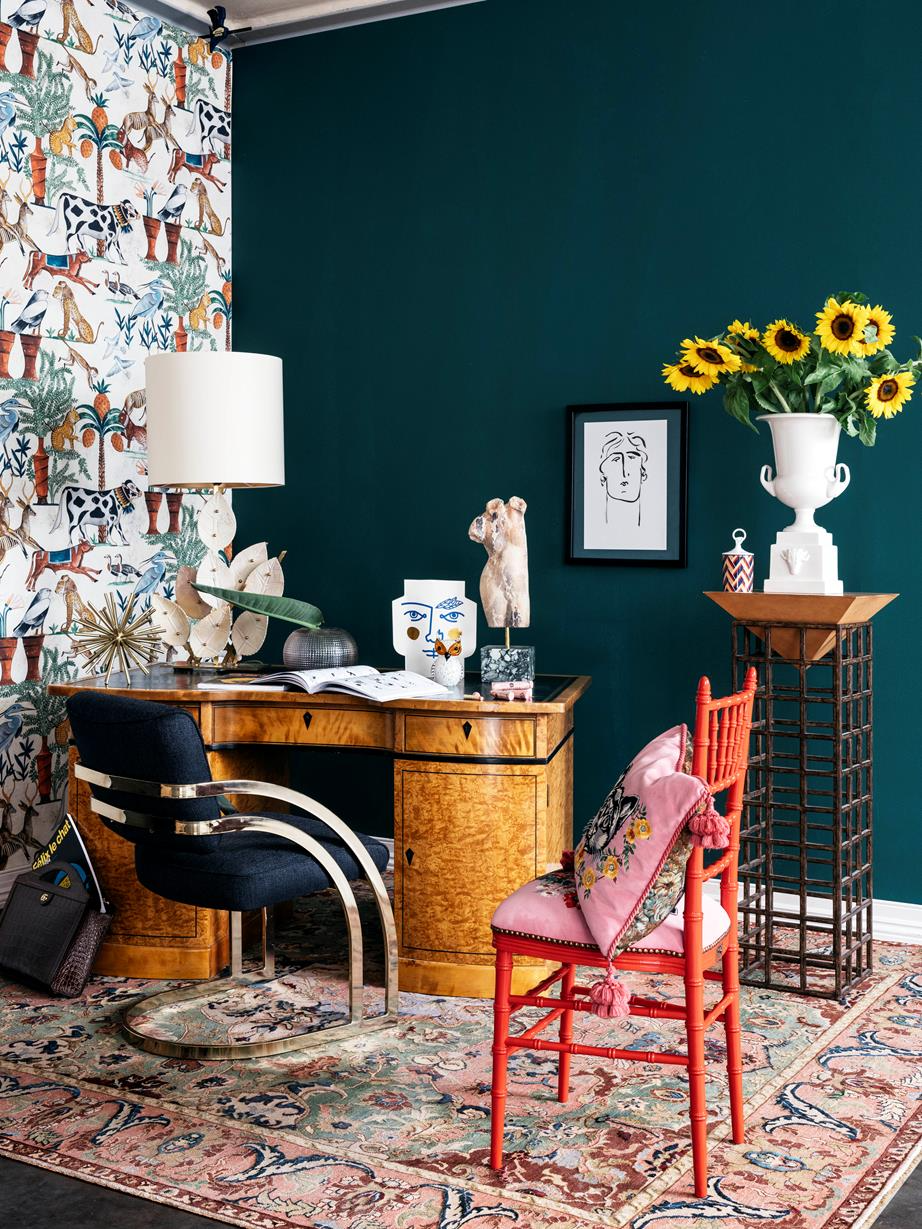
Productivity and inspiration flourish in a creatively organized workspace:
A. Bold Desk and Chair: Choose a desk in a statement color or with patterned fronts; pair with an upholstered chair in a contrasting hue.
B. Gallery Wall of Inspiration: Pin up art, quotes, photos, and fabric swatches on cork boards or behind glass for constant motivation.
C. Mix Functional Storage: Combine open shelving with colorful boxes, baskets, and ornate file organizers to keep supplies accessible yet visually engaging.
D. Patterned Flooring: Use a patterned rug or herringbone tile beneath the desk to delineate the workspace.
E. Colorful Accessories: Fill pen holders, organizers, and desk lamps with bold accents to energize the environment.
F. Layered Lighting: Incorporate desk lamps, floor lamps, and overhead lighting in varied styles for both function and flair.
By surrounding yourself with inspiring color and pattern, your home office becomes a stimulating creative laboratory.
Harmonizing Multiple Maximalist Elements
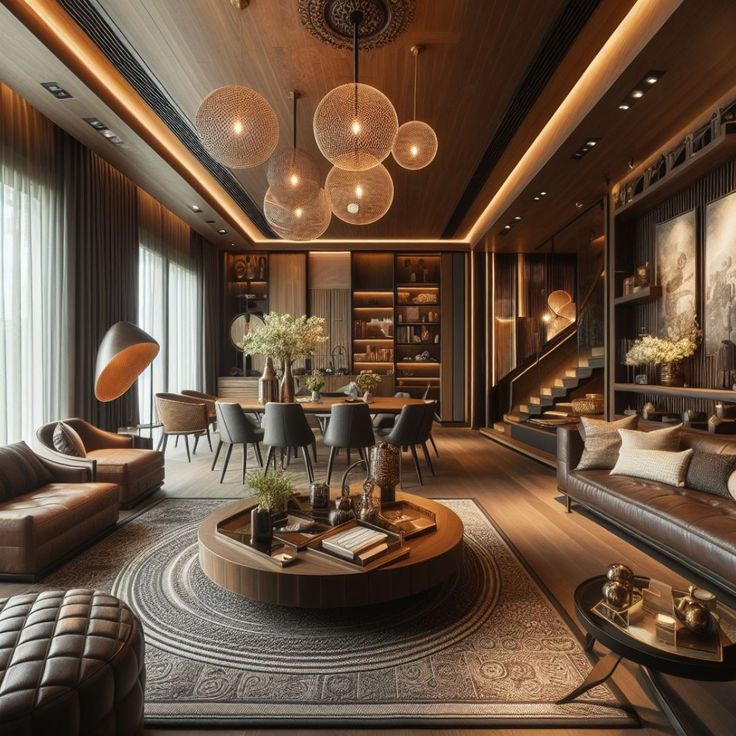
Pairing several maximalist spaces within one home requires cohesion:
A. Color Continuity: Select a core palette—three to five hues—that appear in varying proportions across rooms.
B. Pattern Scale Variation: Use large‑scale prints in one area and smaller‑scale patterns elsewhere to avoid visual fatigue.
C. Consistent Accents: Repeat certain accent materials—brass, rattan, or marble—across furnishings and fixtures.
D. Transitional Pieces: Employ neutral or semi‑neutral hallways and landings with selective patterns to ease transitions.
E. Shared Motifs: Incorporate a recurring motif (e.g., botanical shapes, geometric lines) in textiles and art to tie spaces together.
F. Rhythmic Repetition: Repeat one bold element—like emerald green chairs or baroque mirrors—in multiple rooms to create visual flow.
With strategic repetition and variation, each maximalist room feels distinct yet part of a harmonious whole.
Shopping and Sourcing Tips
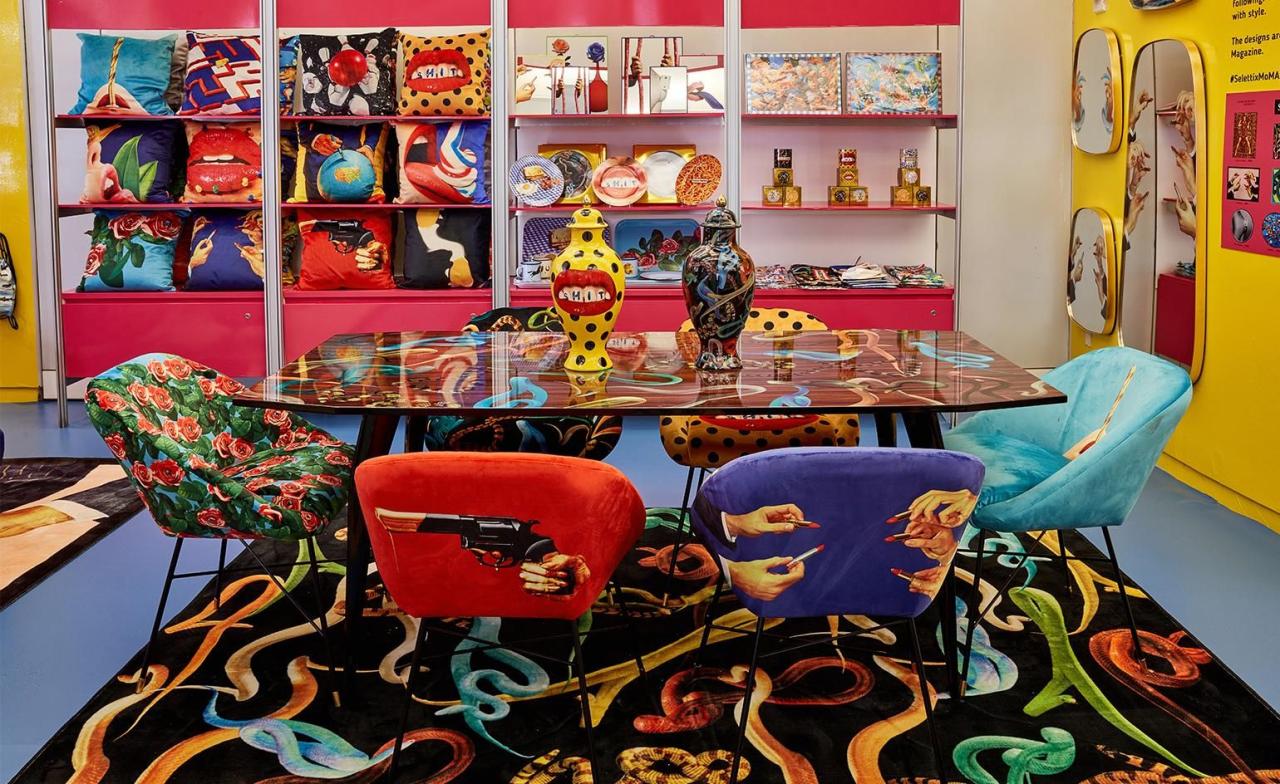
Building a maximalist environment is a curated journey. Use these tactics:
A. Thrift and Antique Markets: Discover unique vintage pieces—mirrors, lamps, rugs—that add history and charm.
B. Local Artisans: Commission one‑of‑a‑kind art or furniture to infuse authenticity and support small businesses.
C. Online Marketplaces: Explore global vendors for bold fabrics, wallpapers, and decorative objects unavailable locally.
D. DIY Customization: Paint thrifted frames in metallic or neon hues; decoupage patterns onto drawers or tabletops.
E. Sample First: Order wallpaper and fabric samples to test color and scale before committing to large orders.
F. Seasonal Sales: Plan larger purchases around major sale events to invest in statement pieces at reduced prices.
These sourcing strategies balance uniqueness, quality, and budget considerations.
Maintenance and Organization
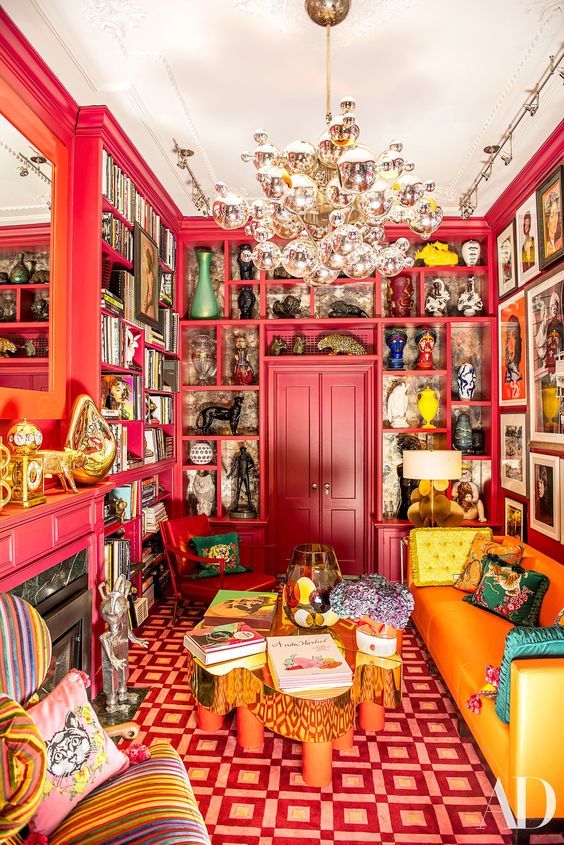
Maximalism thrives on layering but requires order beneath the surface:
A. Declutter Regularly: Edit belongings seasonally to keep displays fresh and remove items that no longer spark joy.
B. Hidden Storage: Use ottomans, trunks, and baskets to stow away less‑used items while maintaining visual richness.
C. Labeling Systems: Clearly label boxes and bins so hidden storage remains functional.
D. Dust and Clean: Frequent dusting of ornate surfaces and textiles preserves color vibrancy and fabric health.
E. Rotate Displays: Swap art and collectibles periodically to refresh the room’s narrative.
F. Protective Measures: Use coasters, placemats, and fabric protectors to guard bold surfaces from spills and wear.
Underpinning maximalist exuberance with smart organization ensures longevity and ease of living.
Future Directions in Maximalism
As design evolves, maximalism will continue to adapt and surprise:
A. Tech-Integrated Decor: Expect LED‑lit wallpapers, pattern‑projecting fixtures, and AI‑curated art walls that shift moods on command.
B. Sustainable Extravagance: Upcycled materials—plastic‑bottle rugs, reclaimed‑wood accent pieces—will blend opulence with eco‑ethics.
C. Cross‑Cultural Fusion: Increasing global interconnectedness will introduce new textiles, motifs, and crafts into maximalist palettes.
D. Biophilic Layers: Living walls, hanging gardens, and terrariums will intertwine maximalist patterns with lush greenery.
E. Interactive Installations: Multi‑sensory décor—sound‑responsive lighting, scented panels—will deepen immersive environments.
F. Augmented Reality Previews: AR apps will allow users to virtually layer patterns and furnishings before purchasing, reducing risk and fueling creativity.
These innovations will keep maximalism at the cutting edge of interiors, marrying abundance with technology and sustainability.
Conclusion
Maximalism champions the joy of “more,” encouraging individuals to craft spaces that serve as canvases for their identities. By layering textures, mixing patterns, and curating meaningful collections, maximalist design fosters environments of warmth, creativity, and personal narrative. With clear principles, practical room‑by‑room guidance, and forward‑looking trends, this article equips you to embrace maximalism confidently—turning every corner of your home into a bold, unforgettable statement.

